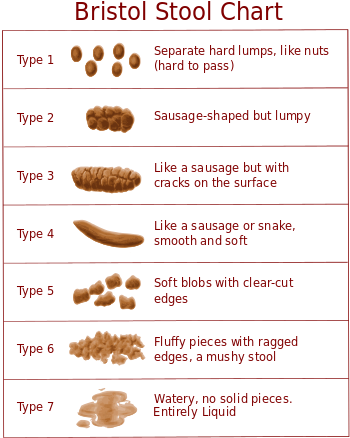Digestive health is very, very important. In fact, I believe that digestion is the foundation of your health, as it affects every system in your body. If it is not functioning optimally, it can impact everything from hormonal balance, to mood, weight gain, nutritional status, the ability to get a good night’s sleep, and even gene expression.
When working with clients, digestion is often the first place I look to when addressing any kind of health concern. Since I often find myself giving the same advice to the majority of the people I work with, I decided to include my top advice in a blog post for you.
What are some common signs that your digestion could be improved?
- Regular bloating, bad breath, gas, heartburn/reflux or vomiting
- Nausea during or after meals
- Intestinal cramping
- Feel tired after eating
- Have less than 1 bowel movement a day, or stool is hard & dry (see below)
- Frequent diarrhea, or alternate between constipation & diarrhea
- Partially undigested food or oils in stool
Many of those symptoms fall under the umbrella of what is called Irritable Bowel Syndrome (IBS). This essentially means that the bowels are inflamted, and hyper-sensitive, which can cause a wide number of digestive irregularities and discomforts. The recommendations below are all valuable for IBS sufferers, and if you would like to read more about IBS specifically, check out this article by my teacher, Aviva Romm, “Irritable bowel syndrome: It’s fixable, here’s how”.

http://en.wikipedia.org/wiki/Bristol_stool_scale
This is the Bristol Stool Scale. It is a helpful tool to help you identify what a healthy bowel movement should look like. Anything between 3 and 5 would be considered healthy. You should have at least 1 bowel movement every day, and it should be easy to pass.
With that out of the way, let’s jump right into my favorite recommendations for a happy, healthy belly!
1. Drink a glass of warm water when you wake up

Upon waking, before you eat anything, slowly drink a tall glass of warm water. Ideally, add a teaspoon of fresh lemon juice or apple cider vinegar to the water. This combination stimulates your liver & gall bladder, and helps helps kick-start your digestive juices. This creates a favorable environment for digestion for the rest of the day.
2. Eat breakfast
This may seem obvious, but many people are too rushed in the morning and skip their first meal of the day. Or even worse, they just drink coffee! Bad news for your belly, and for your hormones.
Even if you are not someone that has a big appetite in the morning, make sure you eat something substantial. Drink your glass of warm water, and wait at least half an hour before eating breakfast. Stomach energy is strongest in the morning, and it is important to support this aspect of your natural internal clock. Eating a balanced breakfast that contains fats, proteins and some fruits & vegetables will ensure that you have energy for the rest of the day. It can help you avoid that mid-afternoon crash, and will also help ensure that your digestion is strong for the rest of the day.
3. Eat fermented foods regularly
Fermented foods contain beneficial bacteria that help populate our gut. There are somewhere between 300 and 1,000 different species of bacteria that inhabit our intestines and colon. These bacteria have the very important job of breaking down the food we eat and extracting it’s nutrients. They also play a key role in our immune system. Bacteria account for 60% of the mass of our feces. Constipation and small bowel movements can be a sign that there is inadequate gut flora, and that ingesting more beneficial bacteria is in order.

Although many people like taking probiotic supplements (which contain beneficial bacterial strains), the absolute best way to get probiotics is through the consumption of fermented foods. Dr. Mercola recently had sauerkraut (fermented cabbage) analyzed for it’s probiotic/bacterial count. He was curious to compare it to commercial supplements. “We found in a 4-6 ounce serving of the fermented vegetables there were literally ten trillion bacteria.” This translates to 2 onces of sauerkraut having more beneficial bacteria than a full bottle of probiotic capsules! So ditch the pills, and eat some fermented foods!
In addition to sauerkraut, other great fermented foods to include in your diet daily include: yogurt, milk or water kefir, sourdough, kombucha, kimchi, and miso. Many of these are actually very easy to make yourself for very little money! I highly recommend the book Wild Fermentation, by Sandor Katz. It contains lots of great information on fermenting foods at home.

4. Take bitter herbs before eating
Like lemon juice & apple cider vinegar, bitter herbs help stimulate bile flow and prepare your body for digestion. Bitter tasting herbs are generally consumed in a tincture (an alcohol extract) as they are often not very pleasant tasting, and drinking a cup of tea may not be very enjoyable. My favorite bitter herbs to consume before a meal include dandelion root, yellow dock root, blue vervain, and burdock root.
5. Eat slowly
Eating too fast can make it difficult for your stomach to handle all the food at once. Chewing your food thoroughly, and eating at a slow pace, can actually make a big difference in how easily you digest your meals. Eating slowly also helps prevent over-eating, as it takes at a minimum 20 minutes for the brain to receive the signal that hunger has been satiated.
6. Do not eat before going to sleep
Digestion naturally slows down later in the day, which is why it is often recommended to have your biggest meals of the day for breakfast and lunch, and keep dinner lighter. Eating food before bed means that your digestion will be sluggish and you will not digest properly. It is ideal not to eat for 2-3 hours leading up to bed time.
Another important aspect of eating dinner earlier is how it affects melatonin production and sleep. Melatonin is an important hormone that is only produced at night. It is a precursor to many other hormones, and as such, plays an critical role in hormonal balance. The pineal gland needs 2 things to produce melatonin: darkness and hypoglycemia (low blood sugar). A hypoglycemic state naturally occurs at night when you haven’t eaten for several hours. If you eat right before bed, your blood sugar will be elevated, thus affecting the production of melatonin, and potentially causing sleep disturbances, insomnia, and hormonal imbalances.
7. Eat more vegetables and fiber
These are two things that I most often see are lacking in people’s diets. I won’t go into details about the importance of vegetables – they are powerhouses of nutrition, and should form the bulk of your diet. Are you eating vegetables at every meal, including breakfast? You should be. Vegetables are also an important source of fiber.
Fiber is never absorbed by the body but it plays a major role in digestion and nutrient absorption. Do you get fiber in your diet every single day? If you don’t know the answer to that, you may need to eat more. My favorite sources of healthy fiber include flax seed meal, chia seeds, oats, lentils, and split peas. Chronic constipation or chronic diarrhea is a sure sign that more fiber is needed in the diet.
8. Drink more water
Water is essential for the digestive and elimination functions to go smoothly. I am not a fan of rigid guidelines for how much water one should drink, but I generally recommend drinking close to half a gallon every day. This translates to about 1.8 liters, or 8 tall glasses of water. Herbal teas and infusions count toward this total, too.
Not all water is created equal either. In short, natural spring water or good well water is absorbed more readily by the body and hydrates more effectively. Municipal water, and most “filtered water” (even reverse osmosis) generally contains many chemicals and impurities that can impact how well that water is absorbed.
9. Take time to poop
Seems obvious, right? But many people go through each day rushing from one place to another, one activity to the next, and do not pay attention to their bodily needs. If you feel like you need to go when you aren’t home, and you hold it in for long periods of time, this can impact your elimination negatively. When you feel the need, go. Your gut will thank you.
Most ancient healing traditions agree that having a bowel movement upon waking, or early in the morning, is ideal. If you have never had one, it may be worth slowing down in the morning and giving yourself time to sit on the toilet and see if your body has a need to eliminate. I am not saying that one should sit on the toilet for long periods of time, straining, or trying to have a bowel movement. What I am advocating is awareness, and slowing down. You may find that when you start drinking lemon or ACV water upon waking, you will start having regular, healthy bowel movements each morning.
10. Stay physically active
Regular physical activity and exercise helps circulation, digestion and elimination. Talking a mile long brisk walk every day can go a long way in improving digestive health. I am a big fan of going for a walk after a large meal, especially after dinner. However, be sure to avoid rigorous exercise for at least an hour after eating.


This post is so informative and helpful. I’m really grateful for Aviva Romm’s article, too. Thanks for sharing 🙂
Thank you for sharing this useful information
Lots of great insight and ideas to improve and include in my daily practice. Thanks!